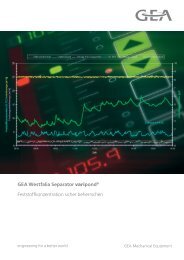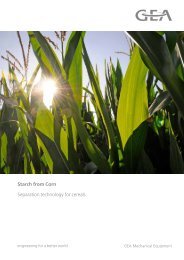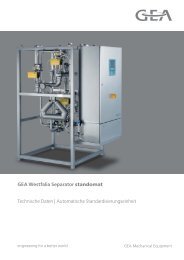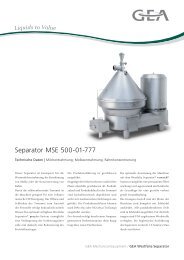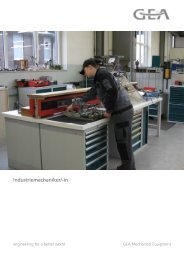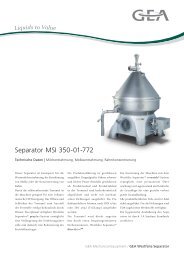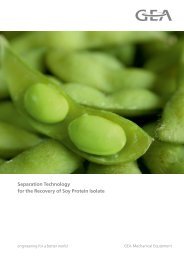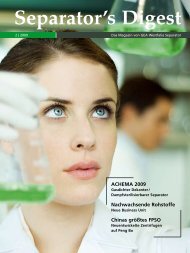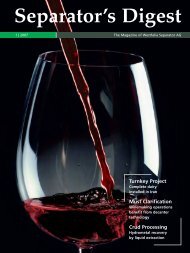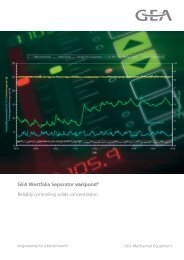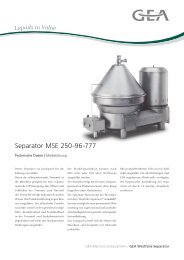Separator's Digest - GEA Westfalia Separator Group
Separator's Digest - GEA Westfalia Separator Group
Separator's Digest - GEA Westfalia Separator Group
Create successful ePaper yourself
Turn your PDF publications into a flip-book with our unique Google optimized e-Paper software.
WeStFaLIa SeParatOr vinex – the advantaGeS at a GLanCe<br />
Continuous method of<br />
operation<br />
Procedure reduces the process<br />
times, the amount of labour<br />
input and thus the variable<br />
unit production costs<br />
No longer necessary to allow<br />
mash to stand for up to twelve<br />
hours, and the corresponding<br />
mash tanks are also no longer<br />
necessary<br />
Very gentle technology<br />
dustrial practise with its entire harvest for the first<br />
time in 2003. the Fachhochschule Wädenswil,<br />
Switzerland, had previously carried out a comprehensive<br />
oenological process comparison between<br />
a press and a decanter. <strong>Separator</strong>‘s digest spoke<br />
with Wilfried dörr about <strong>Westfalia</strong> <strong>Separator</strong><br />
vinex.<br />
Only a continuous system can be<br />
used for operations of this order<br />
of magnitude<br />
<strong>Separator</strong>‘s <strong>Digest</strong>: Mr. Dörr, how was the<br />
<strong>Westfalia</strong> <strong>Separator</strong> vinex process installed<br />
in Badischer Winzerkeller?<br />
as a large operation, we receive all grape types<br />
and all quality stages from all wine growing<br />
regions in the area. We receive approximately<br />
60 to 80 different batches every day. Badischer<br />
Winzerkeller had previously used a continuous<br />
process in pressing technology, with scroll-type<br />
presses which had been installed during the<br />
1970‘s and which now meant that a reinvestment<br />
was necessary. It was clear that only a continuous<br />
system could again be applicable for an operation<br />
of this order of magnitude. If a company such as<br />
Badischer Winzerkeller wanted to operate on a<br />
discontinuous basis with pneumatic tank presses,<br />
which is actually common practise in the pressing<br />
industry, an installation featuring around 25 tank<br />
presses would have been necessary. this also<br />
does not take account of the manpower necessary<br />
for operating such a installation. a further<br />
possibility of continuous operation, apart from<br />
the scroll-type press, would have been the band<br />
press, which is used in many applications in the<br />
fruit juice field, although it involves microbiological<br />
problems in the trub. the only meaningful<br />
alternative was the decanter.<br />
<strong>GEA</strong> <strong>Westfalia</strong> <strong>Separator</strong> Process 17<br />
Closed and thus hygienic<br />
juicing<br />
Easy to clean<br />
Low coarse trub content<br />
Short pay-back times<br />
Sensory quality fully<br />
comparable with that of<br />
the traditional methods<br />
Suitable for all sizes of<br />
operation<br />
Can be used for red grapes as<br />
well as white grapes<br />
Gentle juicing system<br />
<strong>Separator</strong>‘s <strong>Digest</strong>: What are the main<br />
quality advantages of <strong>Westfalia</strong> <strong>Separator</strong><br />
vinex in your opinion?<br />
decanters were tested at the beginning of the<br />
1990‘s in the wine industry, although unsatisfactory<br />
results were achieved at that time. the<br />
problem with the grape mash is that it is not a<br />
homogeneous material. Sometimes it contains<br />
more grapes, sometimes more seeds, and sometimes<br />
more skin. Only after certain aspects had<br />
been adapted was the decanter able to cope with<br />
this inhomogeneous mash. For instance, the drive<br />
of the scroll had to be regulated, in other words,<br />
the power consumption had to adjust to the<br />
solids content, depending on the consistency of<br />
the mash.<br />
Or an additional aspect: when the mash is pumped<br />
into the machine through a stationary stainless<br />
steel tube when the bowl is rotating at 2500<br />
revolutions per minute, this results in high<br />
mechanical strain. It was possible to eliminate this<br />
problem by ensuring that the inlet tube rotated<br />
together with the bowl. the mash is accelerated<br />
in the feed tube, and enters the machine with<br />
approximately the same speed as the bowl. this<br />
results in a gentle juicing process. In the analysis,<br />
it can be established that a decanter does not<br />
expose the product to any mechanical strain. We<br />
do not have any increase in tannin. an increase in<br />
tannin would mean that seeds had somehow<br />
been crushed. We do not want to have this bitter<br />
seed tannin in the wine. We want to have the<br />
polyphenols from the skin of the grapes and<br />
therefore require a juicing system which is as<br />
gentle as possible. this is guaranteed because the<br />
seeds are immediately conveyed to the periphery<br />
<strong>Separator</strong>’s <strong>Digest</strong> 3 | 2008



